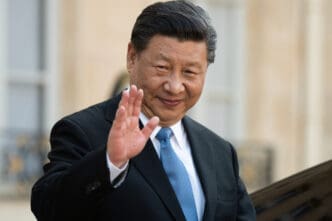Executive Summary
- Chinese President Xi Jinping congratulated newly elected KMT leader Cheng Li-wun, urging efforts to advance “reunification” and strengthen the “common political foundation” between the Communist Party and KMT.
- Cheng Li-wun’s response to Xi emphasized “members of the Chinese nation” and the need for cross-Strait exchanges for peace, but did not explicitly mention political union, while also opposing increased Taiwan defense spending.
- The KMT leadership election was marked by accusations of Chinese interference, with claims of disinformation and calls to reduce pro-China influence, although China dismissed these allegations.
The Story So Far
- Chinese President Xi Jinping’s congratulatory message to the KMT’s new leader, urging “reunification,” stems from Beijing’s consistent drive to integrate Taiwan and its preference for the KMT as a dialogue partner due to the party’s traditional advocacy for closer cross-strait ties, contrasting with Taiwan’s ruling DPP which China views as “separatist.” The KMT, despite its pro-Beijing history, is navigating a complex political landscape where its new leader, Cheng Li-wun, emphasizes ethnic connection and cross-strait exchanges for peace and stability, while also facing internal calls to reduce pro-China influence and prioritize Taiwanese voter sentiment.
Why This Matters
- The election of Cheng Li-wun as the KMT’s new leader, coupled with President Xi’s congratulatory message urging “reunification,” signals a complex future for cross-strait relations, as the KMT, holding a parliamentary majority with allies, will play a crucial role in shaping Taiwan’s approach to Beijing, particularly given Cheng’s emphasis on ethnic ties and opposition to increased defense spending, despite underlying accusations of Chinese interference in the KMT’s internal election.
Who Thinks What?
- President Xi Jinping and China’s Communist Party urge the KMT to strengthen their “common political foundation” and “advance national reunification,” viewing the KMT as a preferred dialogue partner.
- KMT leader Cheng Li-wun emphasizes the shared identity of “members of the Chinese nation” and the need to strengthen cross-Strait exchanges and cooperation for peace and stability, while not explicitly mentioning union with Beijing.
- Jaw Shau-kong, a KMT member, and the DPP accuse China of interfering in the KMT leadership election, with Jaw also urging the KMT to reduce pro-China influence and focus on Taiwanese voters.
Chinese President Xi Jinping has sent a congratulatory message to Cheng Li-wun, the newly elected leader of Taiwan’s main opposition Kuomintang (KMT) party, urging efforts to advance “reunification.” The message on Sunday comes amid rising tensions across the Taiwan Strait and accusations of Chinese interference overshadowing the KMT’s internal election. Cheng Li-wun is set to assume leadership of the KMT on November 1.
Cross-Strait Dialogue and Reunification
President Xi, in his capacity as head of China’s Communist Party, called for the KMT and the Communist Party to strengthen their “common political foundation.” He further encouraged both parties to “unite the vast majority of people in Taiwan to deepen exchanges and cooperation, boost common development, and advance national reunification,” according to Xinhua news agency. The KMT traditionally advocates for closer ties with Beijing and is viewed by China as a preferred dialogue partner, in contrast to Taiwan’s ruling Democratic Progressive Party (DPP) and President Lai Ching-te, whom Beijing considers a “separatist.”
In her response to President Xi, Cheng Li-wun did not explicitly mention union with Beijing. Instead, she stated that both sides of the Taiwan Strait are “members of the Chinese nation,” a term referring to ethnicity rather than nationality. Cheng emphasized the need for both parties to “strengthen cross-Strait exchanges and cooperation on the existing foundation” to promote peace and stability.
Taiwan’s Political Landscape
Cheng Li-wun, 55, secured the KMT leadership despite the party’s loss in last year’s presidential election. The KMT, along with its ally the Taiwan People’s Party, collectively holds a majority of seats in Taiwan’s parliament. A key policy stance for Cheng is her opposition to increasing Taiwan’s defense spending, which stands in contrast to President Lai’s security agenda.
Accusations of Interference
The KMT leadership election was marked by accusations of Chinese interference. Jaw Shau-kong, the KMT’s vice presidential candidate last year and a supporter of Cheng’s rival, former Taipei mayor Hau Lung-bin, claimed that social media accounts had disseminated disinformation about Hau. China, however, dismissed these claims on Wednesday, stating that the election was an internal KMT matter and that online comments did not reflect an official stance.
On Sunday, Jaw Shau-kong publicly urged the KMT to reduce pro-China influence, asserting that the majority of Taiwanese desire peaceful relations and dialogue with China. He stressed that “The KMT must recognise that elections are held in Taiwan, and voters are in Taiwan, not mainland China.” Separately, DPP spokesperson Justin Wu claimed on Saturday that there were clear signs of Chinese interference in the KMT election, a comment promptly dismissed by the KMT.
Outlook on Cross-Strait Relations
The exchange between President Xi and Cheng Li-wun underscores the complex and sensitive nature of cross-strait relations, particularly as Beijing continues its push for reunification. The KMT’s internal dynamics and its approach to dialogue with China will likely play a significant role in shaping Taiwan’s political discourse and its interactions with the mainland.








